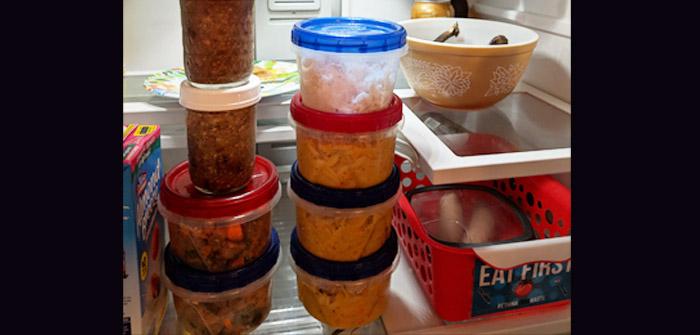(Well organized fridge of a Rethink Waste Project participant with an Eat First basket in use | Photo Courtesy of the Environmental Center)
In the United States, 40 percent of food we are growing, raising and cooking ends up in the landfill. In an effort to increase awareness around the poignant issue of wasted food, the Rethink Waste Project, a program of The Environmental Center, adapted an EPA developed food waste reduction program for Deschutes County residents. So far, 535 households have pledged to waste less food through the Rethink Food Waste Challenge.
Food is wasted throughout the chain: at the farm, in transport, at grocery stores and other distributors, at restaurants and at the household level. The challenge focuses on the household level where 25 percent of what people buy ends up not getting eaten and being tossed.
1 in 8 Americans do not have access to enough food, yet the average family of four spends $130 per month on food they throw away. 135 million tons of greenhouse gases are produced from wasted food. With food waste education, the Rethink Food Waste Challenge will address these social, economic, and environmental issues all at the same time.
The original four-week challenge, which took place in May of 2018, asked people to enter their household’s food waste data while learning tips and tricks to reduce that waste. “I was embarrassed by the amount of food I wasted last week,” said one challenge participant who was surprised by the rate at which his food waste accumulated. “This week, I really made a conscious effort to use up what I already made or what was going to go bad first. And you know what? It worked!”
The data showed a 40 percent decrease in wasted food. A self-paced educational e-mail series is now available on the Rethink Waste Project website for any household that wants to learn more about why wasted food is an important issue and how an individual can help make an impact toward change.
The Eat First basket, a tool from the challenge with the highest impact according to participant feedback, provides a place in your refrigerator to put food that needs to be eaten soon. Free Eat First baskets are available at The Environmental Center, while supplies last.
“We have come a long way in just four weeks,” said another participant. “Even our friends and guests are on board so a nice ripple effect from this challenge. I think the tip that helped the most was not putting too much on your plate at first. You can get more, but clean your plate with a small amount.”
The Rethink Food Waste Challenge was made possible through a waste prevention grant from the Oregon Department of Environmental Quality. The Rethink Waste Project provides waste prevention and reduction education for Deschutes County residents through a partnership with Deschutes County Department of Solid Waste and our local garbage and recycling service providers.





